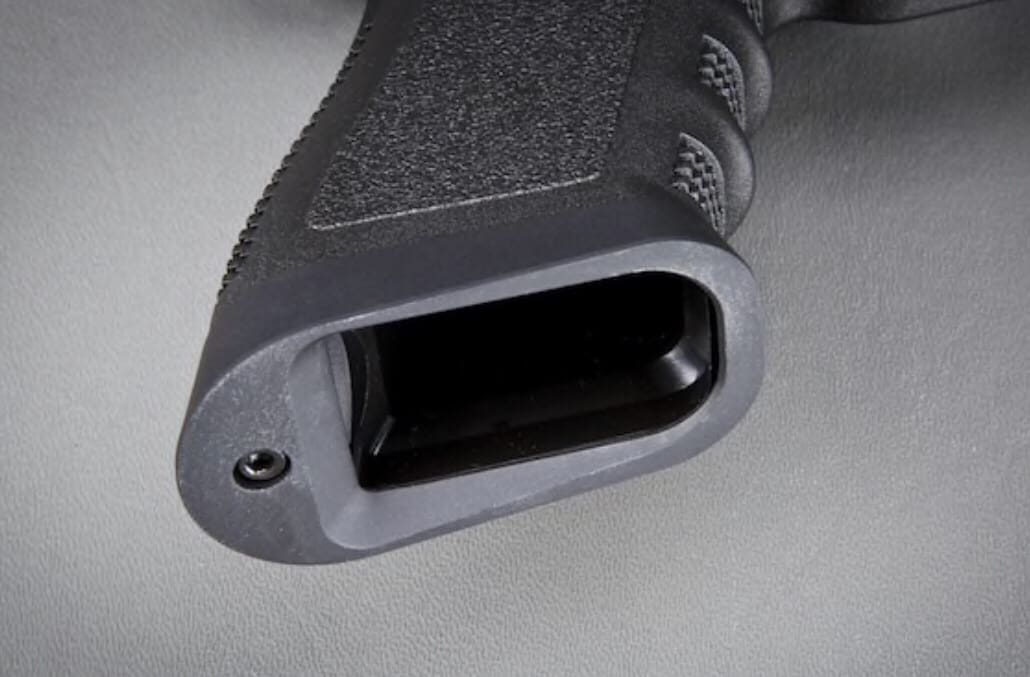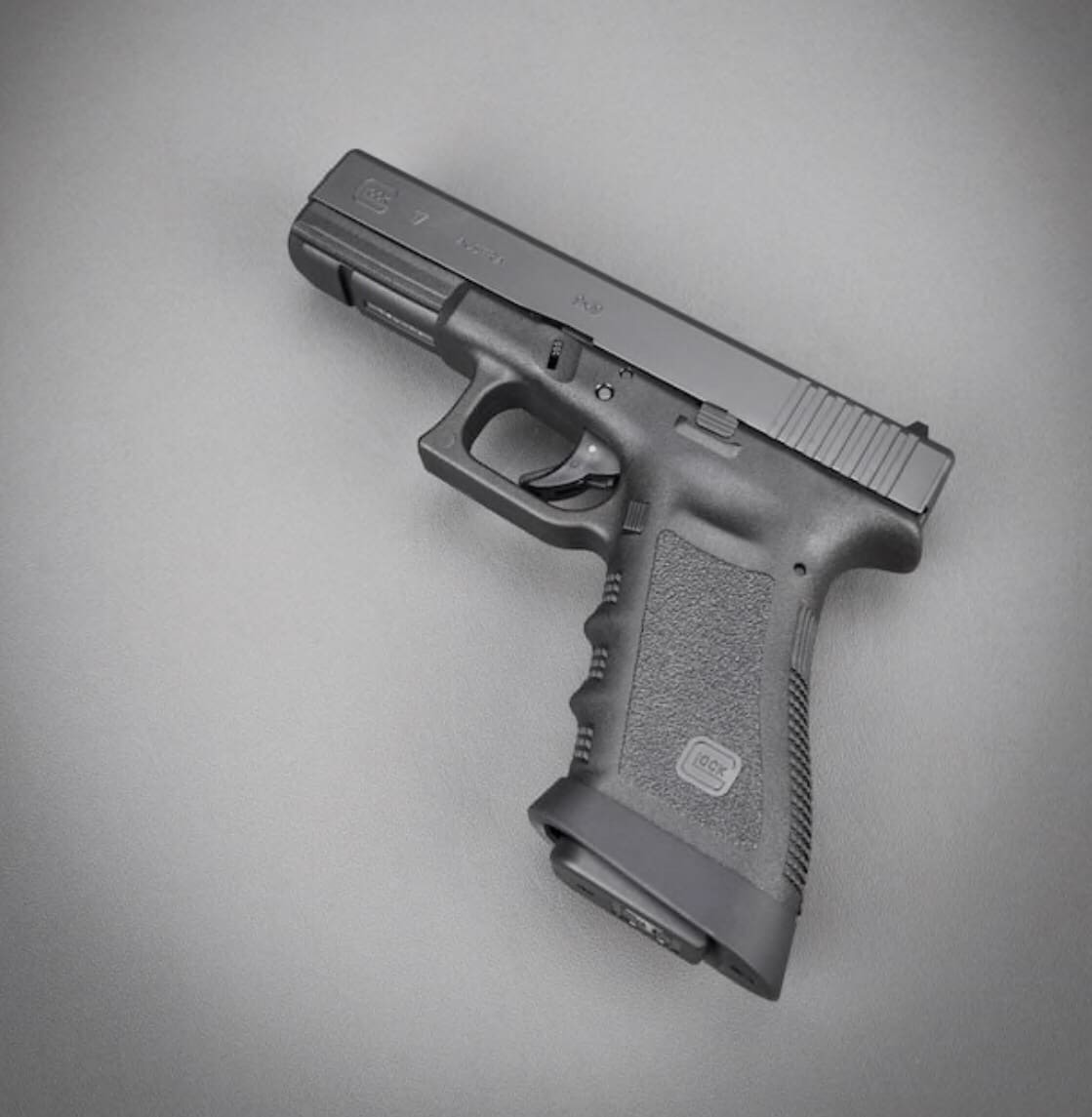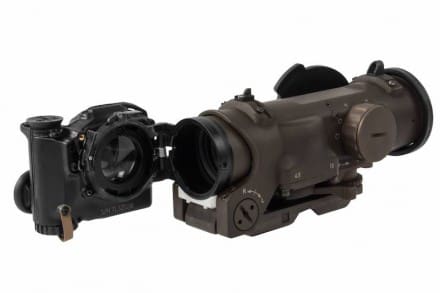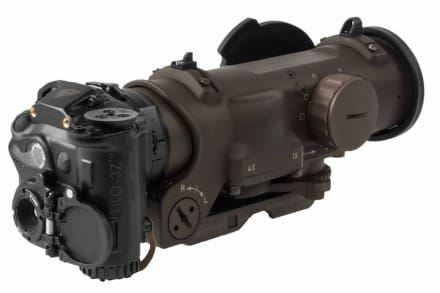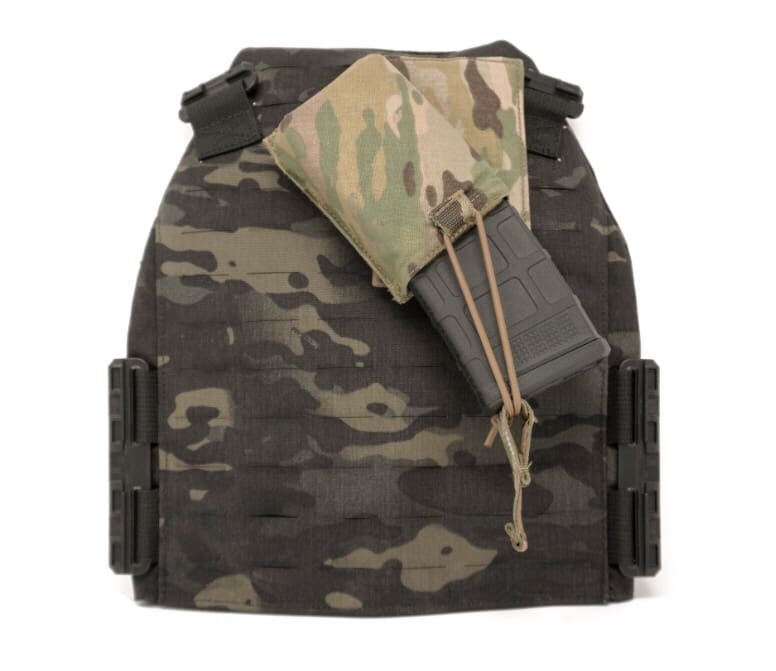I’m sharing this story by the Iowa Air National Guard’s 132nd Wing PAO for two reasons:
1. My father was a full time Guard guy (technician) at the 132nd Fighter Wing while I was growing up, so I have a personal interest.
2. The Wing has given up its F-16s and now conducts ISR, as a ground control station for UAS. When they had fighters, it made sense for the Wing to deploy to other locales, in order to familiarize themselves with the operating environment and practice wartime tasks. Now that they don’t have airplanes, it’s interesting to see the Wing’s personnel still conduct exercises at other bases.
Des Moines, Iowa —
Hawaii. A beautiful island paradise full of scenic ocean and mountain views, pleasant tropical breezes and piña coladas. What the members of the 132d Wing were preparing for though is anything but pleasant. Throughout the beautiful island, gas masks were being donned, weapons readied, sleeves rolled up, boots muddied and sweat falling as Iowa Air Guardsmen prepared themselves and others for hazardous and deadly situations.
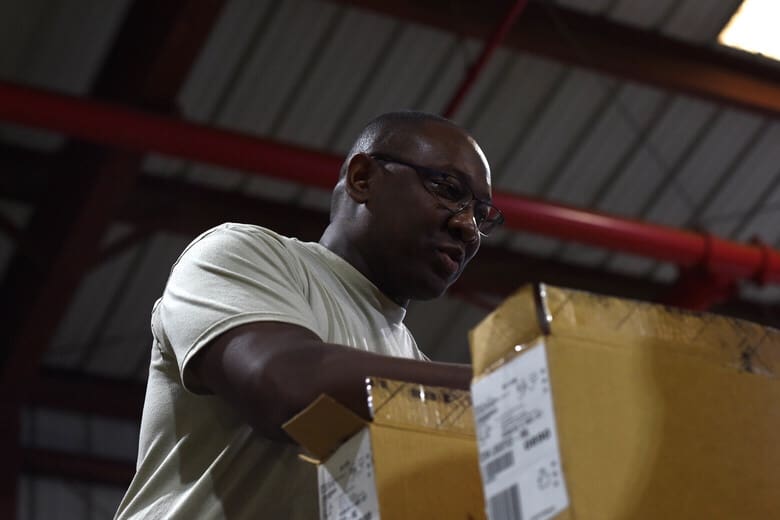
Master Sgt. Patrick Kazeze, 132d Communications Flight, takes inventory of computer equipment February 13, 2018, at Joint Base Pearl Harbor-Hickam in Honolulu, Hawaii. The 132d CF Airmen inventoryed equipment, disposed of outdated computer hardrives and performed maintenance on underground network cables. (U.S. Air National Guard photo by Staff Sgt. Michael J. Kelly)
Approximately 69 Airmen of the 132d Wing deployed to Joint Base Pearl Harbor-Hickam in Honolulu, Hawaii, February 10-23, 2018 for Exercise Sentry Aloha to develop their deployment readiness skills alongside their active duty and Hawaii Air National Guard counterparts.
Airmen from civil engineering, emergency management, fire emergency services, communications, security forces, force support squadron and medical all trained in a variety of environments and scenarios with local active duty and guard members.
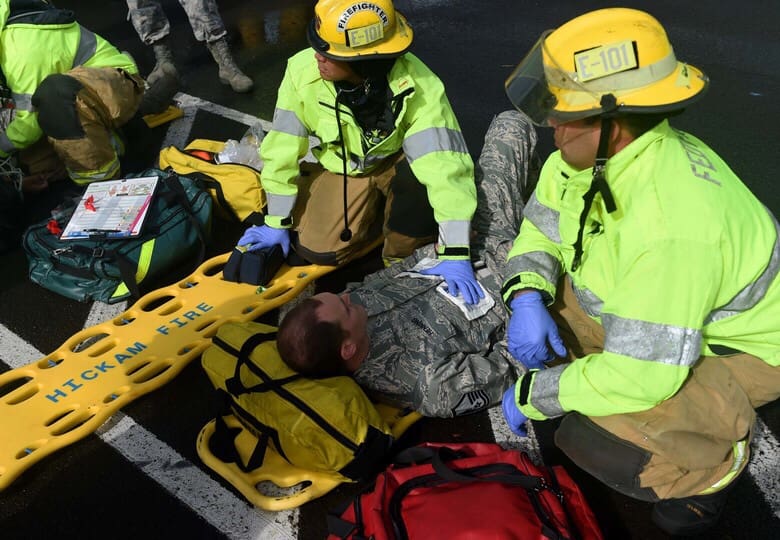
Master Sgt. Matt Henning, 132d Wing Command Support Staff, acts as a casualty during an active shooter drill at Joint Base Pearl Harbor-Hickam in Honolulu, Hawaii. The drill was conducted to measure the response time and readiness of emergency personnel. (U.S. Air National Guard photo by Staff Sgt. Michael J. Kelly)
The Emergency Management (EM) team trained approximately 466 active duty, Guard, and Reservist Airmen in Chemical, Biological, Radiological, Nuclear (CBRN) attack survival skills. The training included proper use of CBRN equipment, simulation of different disaster scenarios, decontamination training and self-aid and buddy care (SABC).
“Getting to see the different perspective each instructor brings really helps pinpoint better ways to help people survive, especially those deploying,” said Tech. Sgt. Rachel Albee, 132d Wing Emergency Management.
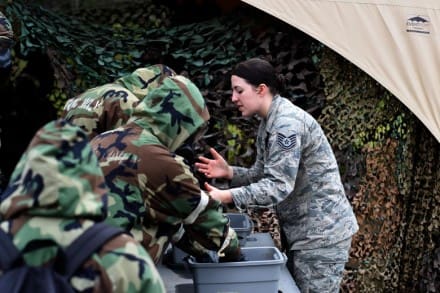
Tech. Sgt. Rachel Albee, 132d Wing Emergency Managment, instructs Hawaii Airmen in proper decontamination tactics February 13, 2018, at Joint Base Pearl Harbor-Hickam in Honolulu, Hawaii. The 132d EM trained approximately 466 active duty, Guard and Reserve Airmen. (U.S. Air National Guard photo by Staff Sgt. Michael J. Kelly)
EM had access to equipment and facilities unavailable their home station which allowed them to effectively train Airmen for disaster scenarios. The efforts of EM were instrumental in deployment readiness of the Hawaii Airmen and were greatly appreciated.
“They integrated well with our flight members and provided much needed support in the readiness surge getting Airmen deployment ready,” said MSgt. Kareem Fuertes, emergency manager, 154th Wing, Hawaii Air National Guard.

Master Sgt. Randy Warden, a combat arms training and maintenance (CATM) instructor, 132d Security Forces Squadron, gives instructions to shooters February 14, 2018, at Joint Base Pearl Harbor-Hickam in Honolulu, Hawaii. The CATM team oversaw the weapons training and qualification for deploying Hawaii Airmen. (U.S. Air National Guard photo by Staff Sgt. Michael J. Kelly)
Instructors from the 132d Security Forces Squadron’s combat arms training and maintenance (CATM) team oversaw the weapons training and qualification for deploying Hawaii Airmen. The training was conducted in new, state of the art indoor range which allowed for a greater diversity of shooting scenarios and allowed for faster qualification time.
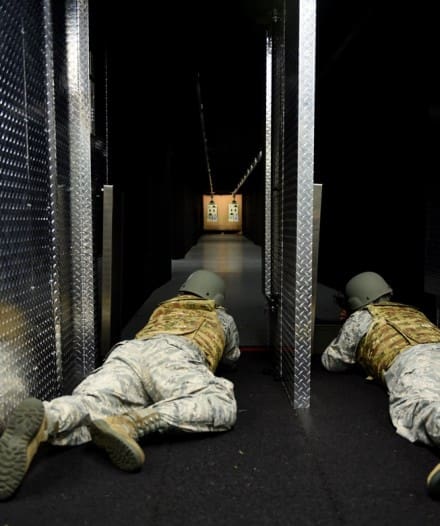
Hawaii Air National Guard Airmen fire M-4 carbines during weapons qualification February 14, 2018, at Joint Base Pearl Harbor- Hickam in Honolulu, Hawaii.The 132d Security Forces CATM team oversaw the weapons training and qualification for deploying Hawaii Airmen. (U.S. Air National Guard photo by Staff Sgt. Michael J. Kelly)
“It was great being able to see how it works and talk to the CATM group here to find out the pros, cons and all the maintenance that is needed if we were able to obtain one,” said Tech. Sgt. Savannah Page, CATM instructor, 132d SFS.
The 132d Medical Group trained on administrative systems and also worked real world medical operations at Tripler Army Hospital in Honolulu, Hawaii. The training included a rare hands-on Aerovac training mission, the on and off loading of patients in critical condition from aircraft. The training, which most ANG members seldom receive except in deployed locations, presented many challenges which the 132d MDG used to prepare themselves for future missions.
“The biggest obstacle for the training is the unpredictability of the actual flights,” said Staff Sgt. Kelsey Searls. “Aircraft availability, stability of the patients, weather, paperwork; all of it can change the flight times at any moment, making training on actual aircraft and running live missions, sometimes impossible to get during an annual training tour.”
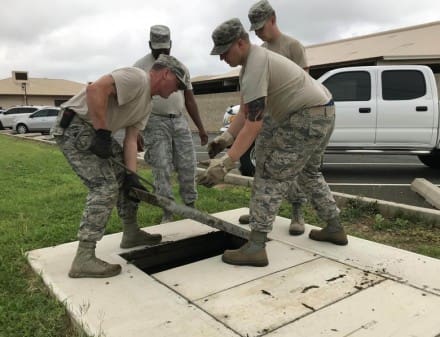
132d Communications Flight Airman from the 132d Wing, Iowa Air National Guard open up a manhole cover while working on underground cables February 22, 2018, at Joint Base Pearl Harbor-Hickam in Honolulu, Hawaii. The 132d CF Airmen inventoryed equipment, disposed of outdated computer hardrives and performed maintenance on underground network cables. (U.S. Air National Guard photo by Staff Sgt. Michael J. Kelly)
132d Communications Flight worked on a variety of projects on base including inventorying equipment, disposing outdated computer hard drives and tapes as well as prepare underground network cables for use in base operations. They also upgraded the base’s computer systems and software.
“It was great getting to work with new people in a total force integrated environment,” said Senior Airman Ben Trotter, spectrum operations technician, 132d Communications Flight. “We provided manpower which organized their assets as well as training for us which will make us a more efficient communications flight.”
Communications Flight Airmen disposed of over 200 computer hard drives, inventoried and processed in approximately 250 computers, updated the software on 40 computers and fixed approximately five thousand feet of network cable.
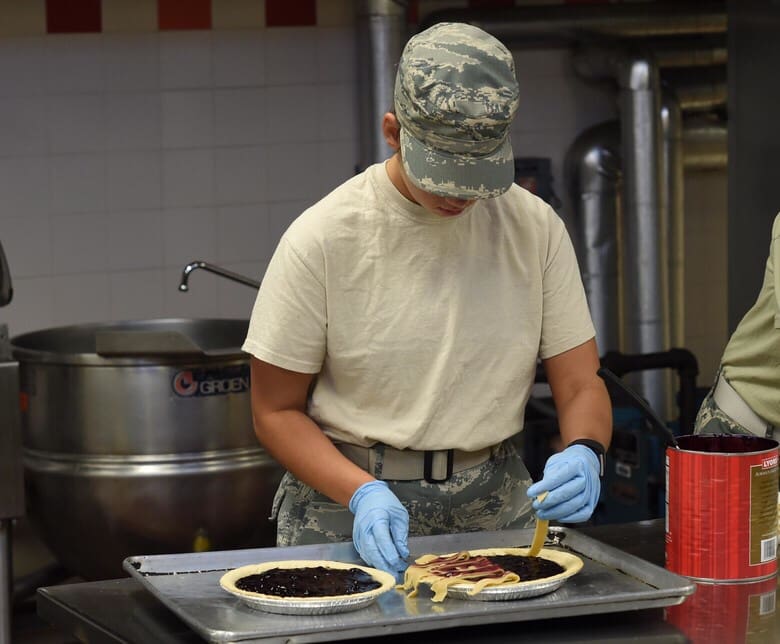
Staff Sgt. Megan Newton, services, 132d Force Support Squadron, makes a pie in the Hale Aina Dining Facility, February 14, 2018, at Joint Base Pearl Harbor-Hickam in Honolulu, Hawaii. The 132d FSS Airmen provided five thousand meals for base members. (U.S. Air National Guard photo by Staff Sgt. Michael J. Kelly)
The 132d Force Support Squadron’s services Airmen provided meals at the Hale Aina Dining Facility on Joint Base Pearl Harbor-Hickam. The Airmen were able take inventory of the produce and supplies of the dining facility which helped them gain more knowledge of accountability systems.
“Working hand in hand with the active duty was rewarding as was the mutual exchange of ideas and knowledge of the services field which will make our shop better,” Chris Newton, services shift leader, 132d FSS.
The services Airmen also helped prepare a special meal for the base in honor of Black History Month. In total, the 132d FSS served approximately five thousand meals to active duty, Guard and Reserve Airmen. They also conducted the physical training tests of approximately 500 Airmen.
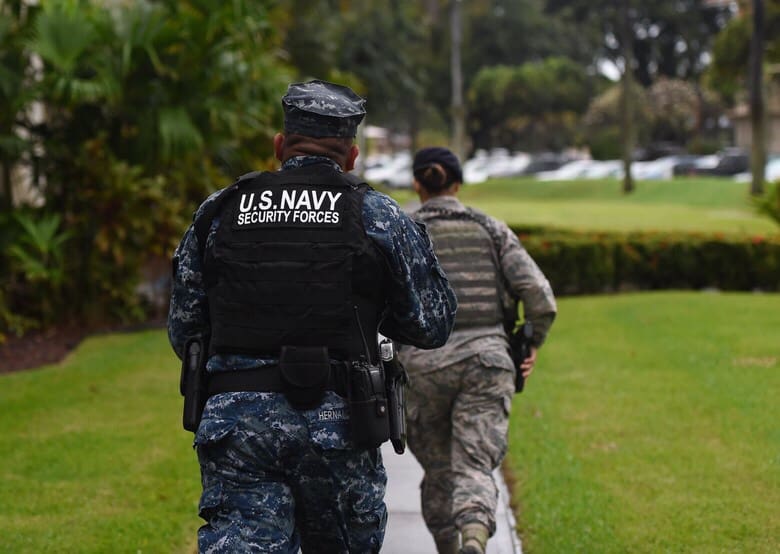
U.S. Navy and Air Force security forces rush towards the scene of a shooting during an active shooter drill February 15, 2018, at Joint Base Pearl Harbor-Hickam in Honolulu, Hawaii. The drill was conducted to measure the response time and readiness of emergency personnel. (U.S. Air National Guard photo by Senior Master Sgt. Robert Shepherd)
Sentry Aloha exercises are held to provide the Air National Guard, U.S. Air Force and other Department of Defense agencies an opportunity to execute current, realistic, integrated training specifically designed to develop combat operations and skill sets.
By Staff Sgt. Michael J. Kelly, 132d Wing Public Affairs


